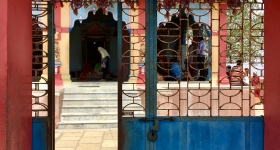Dr. Prabhjot Singh. Image courtesy of the Sikh Coalition.
On the night of September 21st, 2013, Dr. Prabhjot Singh, a 31-year-old physician and professor,
decided to take a walk in his Harlem neighborhood after dropping his wife
and one-year-old son at home. Shortly after, he found himself
surrounded by a group of young men on bicycles, who began
taunting him with verbal and physical abuse. Dr. Singh tried running, but was
unable to escape the attack and was later taken to a hospital and treated for a fractured jaw and other injuries. What triggered the
attack was his visible faith identity -- a turban and beard.
As members of the
world’s fifth largest religion, Sikhs are distinguished by their
identity -- including uncut hair -- which Sikh men are required to keep
covered with a turban (Sikh women also have the option of covering their
hair with a turban). The turban is an article of faith and represents a
Sikh’s commitment to equality, religious pluralism, and justice for all.
As an American,
hearing stories of individuals being attacked because of their identity
always challenges me. As a Sikh woman who does not wear a turban, I
know the privilege that exists with an identity that does not trigger
fear -- my long hair does not pose the same threat. But along with this,
I know that, as a woman, my gender provides its own set of challenges.
Sikh girls and women are also bullied and discriminated against due to
the biases around their hair. I have experienced these myself.
Like many Sikh
women, I also worry about the men in my life who stand out in a crowd. My father, with his impeccably tied turban, and my brother -- whose turban
represents the same commitment to his faith as my long hair does to
mine. I think of my seven-year-old nephew, who in Kindergarten had his patka pulled off his head by a fellow classmate. This happens all too often, and way too close to home.
When I decided to
leave my career in public health over two years ago to work full time
for a civil rights organization committed to defending the right of
individuals to practice their faith, I did not realize that attacks --
such as the one on Dr. Singh -- would be a common and a chronic
issue we would have to address. For example, a grassroots survey of
Sikhs in New York City published by The Sikh Coalition in 2008 revealed
that nine percent of respondents had experienced physical assaults on
account of their religion. A similar survey of Sikhs in the San
Francisco Bay Area in 2010 revealed that ten percent of respondents had
experienced bias-based assaults or property damage on account of their
religion.
When Dr. Singh
spoke at a press conference following the attack, he talked about his reinvigorated
commitment to his community, his drive to continue staying engaged, and
his promise to not lose hope in the neighborhood he calls home. As a
fellow health advocate, I understand this sentiment completely. It’s
what first inspired me to enter a career in public health and it’s what
has allowed me to continue advocating for the right of individuals to
practice their faith in all communities.
It would be a
missed opportunity if we walked away from this incident without learning
what went wrong and without staying engaged. Actually, it is necessary.
Many young Sikhs are being introduced into school systems where
bullying and other forms of bias-based discrimination are rampant. It’s
critical that they don’t normalize this into their adulthood --
agonizing when a global event occurs and waiting for the next act
of violence. We owe it to them to change this reality.
And
there is hope -- like the individuals in the neighborhood who came to Dr. Singh’s
aid. The man that shooed the cyclists away, the woman who helped get
him to the hospital, and the doctors and police who cared for Dr. Singh
and immediately investigated the crime. But let's not
wait for another act of violence before pushing this conversation
further. When will diversity translate to inclusion and when will that
understanding permeate our American neighborhoods?
Every American deserves the right to practice their faith and
represent their culture freely and without fear. It will take Americans
of all faiths to stand with and stand up for their American neighbors
in order for that day to materialize.
***
Simran Kaur is Advocacy Manager for The Sikh Coalition, the nation’s largest Sikh civil rights organization.
This post is the first in a roundtable series exploring multi-faith responses to
the hate crime assault on Dr. Singh in New York City on September 21st -- and how local faith communities
across America can take steps towards mobilizing and
determining their futures.









Comments